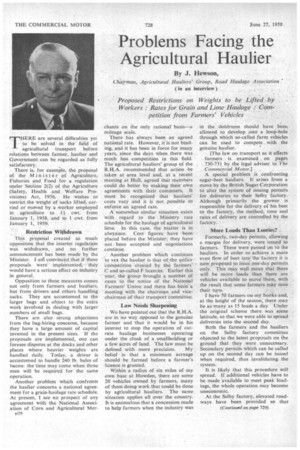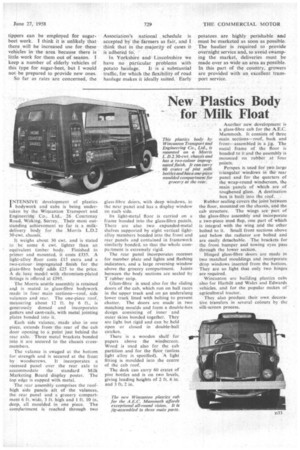Problems Facing the Agricultural Haulier
Page 72

Page 77

If you've noticed an error in this article please click here to report it so we can fix it.
By J. Hewson,
Chairman, Agricultural Hauliers' Group, Road Haulage Association ( in an interview )
Proposed Restrictions on Weights to be Lifted. by . Workers : Rates for Grain and Lime Haulage Competition from Farmers' Vehicles
THERE are several difficulties yet to be solved in the field of
agricultural transport before relations between farmer, haulier and Government .can be regarded as fully satisfactory.
There is, for example, the proposal of the Minister of Agriculture, Fisheries and Food for a regulation under Section 2(2) of the Agriculture (Safety, Health and Welfare Provisions) Act, 1956. He wishes to restrict the weight of sacks lifted, carried or moved by a worker employed in agriculture to 11. cwt. from January 1, 1958, and to 1 cwt. from January 1, 1959.
• Restriction Withdrawn
This proposal created so much opposition that the interim regulation was withdrawn, and no further announcement has been made by the Minister. I aril convinced that if these proposals Were implemented, they would have a serious effect on industry in general.
Opposition to these measures comes not only from farmers and hauliers, but from drivers and others handling sacks. They are accustomed to the larger bags and object to the extra work involved in dealing with larger numbers of small bags.
There are also strong objections from the bag-hiring concerns, because they have a large amount of capital invested in the present sizes. If the proposals are implemented, one can foresee disputes at the docks and other places where heavier weights are handled daily. Today, a driver is accustomed to handle 240 lb. bales of bacon: the time may come when three men will be required for the same operation.
Another problem which confronts the haulier concerns a national agreement for a grain-haulage rate schedule. At present, I see no prospect of any agreement with the National Association of Corn and Agricultural 1VIer
chants on the only rational basis—a mileage scale.
There has always been an agreed natiOnal rate. However, it'is not binding, and it has been in force for many years, since the days when there was much less competition in this field. The agricultural hauliers' group of the R.H.A. recommended that action be taken at area level and, at a recent meeting at Hull, agreed that members could do better by making their own agreements with their customers. It must be recognized that hauliers' costs vary and it is not possible to enforce an agreed, rate.
A somewhat similar situation exists with regard to the .Ministry rate schedule for the haulage of agricultural lime. In this case, the matter is in abeyance. Cost figures have beenplaced before the Minister; they have • not been accepted and negotiations continue.
Another problem which continues to vex the haulier is that of..the unfair "competition created by the farmers' C and so-called F licences. Earlier this year, the group brought a number of cases to the notice of the National Farmers' Union and there has a meeting with the chairman and viceChairman of their transport committee.
Law Needs Sharpening We have pointed out that the R.H.A. are in no way opposed to the genuine farmer and that it would be in his interest to stop the operation of cutrate haulage businesses operating under the cloak of a smallholding or a few acres of land. The law must be defined with more precision. My belief is that a minimum acreage should be farmed before a farmer's licence is granted.
Within a radius of six miles of my own base at Howden, there are some 20 vehicles owned by farmers, many of them doing work that could be done by agricultural hauliers. The same situation applies all over the country. It is anomalous that a concession made to help farmers when the industry was
in the doldrums should have been allowed to develop into a loop-hole through which so-called farm vehicles can be used to compete with the genuine haulier.
[The law on transport as it affects• farmers is examined on pages 730-731 by the legal adviser to The Commercial Motor.]
A special problem is confronting sugar-beet hauliers. It arises from a move by the British Sugar Corporation to alter the system of issuing permits for deliveries to their Selby factory. Although primarily the grower is responsible for the delivery of his beet to the factory, the Method, time and rates of delivery are controlled by the factory.
More Loads Than Lorries? _
Formerly, two-day permits, allowing a margin for delivery, were issued to farmers. These were passed on to the hauliers. In order to achieve a more even flow of beet into The factory it is now proposed to issue one day permits Only. This may well mean that there will be more loads than there are vehicles available to move them, with the result that some farmers may miss their turn. '
I have 50 farmers on my books and, at the height of the season, there may be as-many as 15 loads a day. Under the original scheme there was some latitude, so that we were able to spread deliveries into the second day.
Both the farmers and the hauliers on the Selby factory committee objected to the latest proposals on the ground that they were unnecessary. Secondary permits which can be called up on the second day can be issued when required, thus invalidating the system.
It is likely that this procedure will spread. If additional vehicles have to be made available to meet peak loadings, the whole operation may become uneconomic.
At the Selby factory, elevated roadways have been provided so that (Continued on page 729)
tippers can be employed for sugarbeet work. I think it is unlikely thatthere will be increased use for these vehicles in the area because there is little work for them out of season. I keep a number of elderly vehicles of this type for sugar-beet, but I would not be prepared to provide new ones.
So far as rates are concerned, the Association's national schedule is accepted bY the farmers as fair, and I think that in the majority of cases it is adhered to.
In Yorkshire and Lincolnshire we have no particular problems with potato haulage. It is a. substantial traffic, for which the flexibility of road haulage makes it ideally suited. Early potatoes are highly perishable and must be marketed as soon as possible. The haulier is required to provide overnight service and, to avoid swamping the market, deliveries must be made over as wide an area as possible. In this part of the country, growers are provided with an excellent transport service.








































































































































